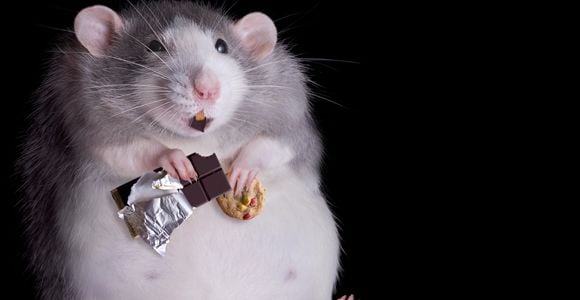Food addiction has historically been a controversial subject because there's no real definition or diagnostic criteria. However, as more scientific evidence emerges, researchers are finding that brain chemistry, self-medicating behaviors, and genetics can all be factors that may lead to food addiction. In a literature review published in the 2011 issue of Current Pharmaceutical Design, brain scan studies revealed that pleasant smelling, looking, and tasting food create similar reactions in the brain as do the use of abusive drugs. Researchers are starting to use substance abuse criteria to determine "food dependence."
Dopamine
Dopamine is a neurotransmitter in the brain that is responsible for providing feelings of pleasure and reward that motivates us to engage in various pleasurable activities. In the Brookhaven obesity study, researchers found that addicts and obese individuals often have fewer dopamine receptors than healthy individuals thereby requiring them seek out more and more because they are never truly satisfied. Repeated exposure to addictive substances can disturb the balance in the frontal cortex of the brain that deals with control, decision making, and judgment.
Cues
Greater drive to chase the dopamine high has been observed when subjects are shown pictures of foods. These same behaviors have been noted in those who relapse after drug abuse. An addicted individual may see someone they've taken the drug with or something else that sparks that memory and the dopamine release triggers the desire to return to it. Food is not much different, except, food is everywhere.
Addictive Foods
Foods that are thought to be potentially addictive include sweets, fats, and sweet/fat/salty combinations. Sugar has been studied most of all foods. In animal studies, the animals tend to develop a tolerance to the sugar and eat more each day. When it's removed from their diet they go through withdrawal by exhibiting anxiety and tremors. For fat, animals tend to have similar behavior but do not go through withdrawal. When rats were given fat and sugar together, they were more likely to be obese than if they were just exposed to sugar or fat alone. It's been theorized that eating normal foods found in nature don't cause addiction and are rarely abused. However, when foods are processed to become hyper-palatable, it changes the body's ability to self-regulate.
How to Change Addictive Eating Behaviors
Be Mindful of Cues
Smells, commercials, friends who you tend to overeat--all of these may trigger you to want to return to old behaviors. Have a strategy ready in case you encounter any of these.
Avoid Problematic Foods
Don't keep foods in your house that you know will cause you to lose control. You don't have to give them up completely, but enjoy them at special occasions when out to eat.
Eat a Balanced Diet
People tend to crave healthier foods once they stick to a healthier diet.
Avoid Crash Dieting
Restrictive eating promotes the intake of palatable foods. Talk to a dietitian if you need help with an eating plan or losing weight.
Manage Stress
Stress can lead to eating hyper-palatable foods. Some people may negotiate with themselves--"I deserve this" or "I need this to help me get over this horrible day." But while there may be some satisfaction during the course of the eating, most people are regretful after. Come up with a non-food strategy to deal with stress when it arises--try breathing techniques, exercise, or call a friend.
Exercise
Exercise has been shown, in both animal and human studies, to increase dopamine receptors and the volume of the brain's cortex.
Mandy Seay is a bilingual registered and licensed dietitian who holds both a bachelor's degree in nutrition and in journalism. After gaining 30 pounds while living abroad, Mandy worked to lose the weight and regain her health. It was here that she discovered her passion for nutrition and went on to pursue a career as a dietitian. Mandy currently works as a nutrition consultant and freelance writer in Austin, Texas, where she specializes in diabetes, weight management and general and preventive nutrition. She recently published her first book, Your Best Health, a personalized program to losing weight and gaining a healthy lifestyle. Please visit Mandy's website at Nutritionistics.com.



